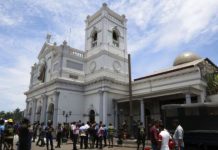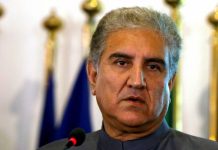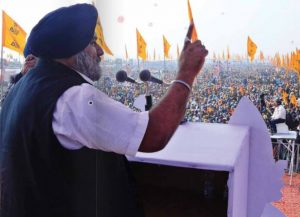 The Akali Dal was formed way back on 14 December 1920 as a task force of the Shiromani Gurudwara Prabandhak Committee, as the principal representative of Sikhs. Surmukh Singh Jhabhal was the first president of the party which first tasted electoral success in the provincial election of 1937 when it had won 10 seats. In the provincial election of 1946, the party bagged 22 seats and joined the coalition government headed by Unionist Party’s Khizar Hayat Khan Tiwana along with Indian National Congress.
The Akali Dal was formed way back on 14 December 1920 as a task force of the Shiromani Gurudwara Prabandhak Committee, as the principal representative of Sikhs. Surmukh Singh Jhabhal was the first president of the party which first tasted electoral success in the provincial election of 1937 when it had won 10 seats. In the provincial election of 1946, the party bagged 22 seats and joined the coalition government headed by Unionist Party’s Khizar Hayat Khan Tiwana along with Indian National Congress.
In 1950s, the Akali Dal launched the Punjabi Suba movement, demanding a state with majority of Punjabi-speaking people. After the re-organisation of Punjab in 1966, the first government formed was by Akali Dal under Gurnam Singh in 1967. In 1970, Parkash Singh Badal (now patriarch of the party) was sworn in as chief minister for the first time. Badal also remained chief minister from 1977-1980, 1997-2002, 2007-2012 and 2012-17. In 1994, the party opened its doors to members from other faiths. Till then, it was a party with only Sikhs as members.
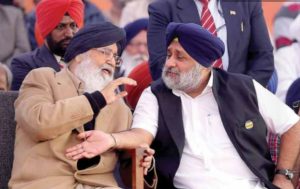 Over the years, Akali Dal president Sukhbir Singh Badal, as part of his social engineering experiment, not just let Hindus, Muslims and Christians join the party, but also gave them tickets to contest the polls. The party suffered its worst defeat in 2017 Assembly election, by getting just 15 assembly seats. Since September 2018, the right-wing party has seen a series of revolts and expulsions.
Over the years, Akali Dal president Sukhbir Singh Badal, as part of his social engineering experiment, not just let Hindus, Muslims and Christians join the party, but also gave them tickets to contest the polls. The party suffered its worst defeat in 2017 Assembly election, by getting just 15 assembly seats. Since September 2018, the right-wing party has seen a series of revolts and expulsions.
Party faces split
As the party leadership was gearing up for grand year-long celebrations to commemorate 100 years of its existence, it is facing a vertical split. The party waded into dissent with the expulsion of a sitting and a former MP. Earlier another senior Taksali leader Sewa Singh Sekhwan had been shown the door.
Their grouse is that the leadership provided by former deputy chief minister and party president, Sukhbir Badal has broken away the Akali Dal from its original moorings. To buttress their arguments, these leaders hold the Senior Badal and his son responsible for mismanaging the sacrilege incidents in 2015 and for the pardon granted to Dera Sacha Sauda chief Gurmeet Ram Rahim. Congress had succeeded in turning public opinion against the Badals on both these issues and won the 2017 elections hands down. As Sukhbir and his brother-in-law Bikram Majithia try to hold the house together, it is obvious that the old rules of power politics in SAD have passed their shelf life.
Though Sukhbir Badal is credited with being good manager of big shows and pulling crowds at public meetings, it seems old fashioned style needs change. In fact a young party-Aam Aadmi Party was able to pose a challenge to this century old party when AAP emerged second at the hustling’s in 2017 elections.
Earlier the results of General Election of 2014 had jolted the then Akali-BJP regime out of its ‘power slumber,’ as voters rejected them over the issues of illegal sand mining and drugs. The rookie AAP was able to win four seats in Punjab in Lok Sabha polls. This equaled the SAD tally of four.
Left with little options, the SAD leadership managed a pardon for the dera chief in September 2015. Granting a pardon to the dera head by the then Jathedar of Akal Takht, Giani Gurbachan Singh was allegedly done in exchange for his support to the Akali Dal in the Assembly elections. Around the same time,
another major drama was unfolding.
A bir of Guru Granth Sahib was stolen on June 1, 2015, from a gurdwara in Burj Jawahar Singh Wala village in Faridkot. Rumours of involvement of dera followers began doing the rounds. However, their involvement was ruled out by the investigating officers from Punjab Police. It was not till September 24 and 25, 2015, that the police became active in the investigation. The trigger was two posters pasted at the samadhi of Pir Dhoda in the same village, and in the nearby Bargari village.
These contained offensive language against the Sikhs and challenged the police to find the missing bir. Pages of Guru Granth Sahib were then found scattered in Bargari on October 11, leading to massive protests. It was at two such protest sites — Kotkapura and Behbal Kalan — that the police used force and two Sikhs were killed.
All this while, the involvement of Dera Sacha Sauda in these sacrilege incidents and the political patronage given to the dera were being speculated. The police investigation never brought out any of these aspects. After Congress came to power, a Special Investigation Team of the Punjab Police headed by DIG Ranbir Singh Khatra “established” the role of dera followers and its top brass. It angered Sikhs across Malwa, which comprised the core vote bank of Akali Dal.
The fact that sacrilege had happened during the rule of Akali Dal and it was unable to solve the crime, went against the party. These proved detrimental for the party’s poll prospects in the Assembly poll. All this while, the dera kept its promise. Akali leaders were called at the dera congregations and support by the sect’s followers was announced for them. It may be mentioned that the strategies to seek dera support was not just restricted to Dera Sacha Sauda, headed by Gurmeet Ram Rahim Singh, now jailed for rape. The then government decided to do nothing about cremating the clinically dead Ashutosh Maharaj, head of the Divya Jyoti Jagriti Sansthan, Nurmahal, in an effort to woo its followers. The Namdharis and Radha Soami Satsang Dera Beas heads and their followers too were kept in good humour.
However, the panthic party was reduced to just 15 seats in the Assembly, its worst ever electoral performance. The political damage to Akali Dal was not over even after its political debacle in 2017. The Congress government constituted a commission of inquiry under Justice Ranjit Singh. Though boycotted by the Akali Dal, it did them a more lethal and lasting damage. It was enough to establish a link between the dera, Akali Dal and the incidents of sacrilege. Even as the Akali-BJP combine decided to stay away from the debate on the report in the Punjab Vidhan Sabha, Congress was successful in taking the gist of the report to people. So SAD went on and on doing one wrong after another.
Revolt in the offing
A rebellion within the party followed. Otherwise known to stick to the diktats of the party leadership, senior leaders started questioning the party president Sukhbir Singh Badal on why did he not participate in the debate on the most important issue facing the Sikh panth. No double, these leaders did not say a word against senior Badal-the former CM Parkash Singh Badal out of respect. However, many voices of dissent started rising, especially by the old-guard (taksali) leaders of the party. A sitting MP of the party, Sukhdev Singh Dhindsa, relinquished all party posts, another sitting MP (Ranjit Singh Brahmpura) has been expelled along with a former MP (Rattan Singh Ajnala), a former minister (Sewa Singh Sekhwan) and two former MLAs (Amarpal Singh Ajnala and Ravinder Singh Brahmpura). With these expulsions, Parkash Singh Badal and Sukhbir Badal seem to have contained the rebellion. At least for now.
A lack of any perceptible action in sacrilege cases of the Guru Granth Sahib, and a 2015 pardon granted by the Akal Takht to Dera Sacha Sauda chief Gurmeet Ram Rahim in a blasphemy case seem to have hit the Shiromani Akali Dal (SAD) where it hurts.
Recently, more than 30 Akali workers resigned from the party in SAD president Sukhbir Singh Badal’s constituency of Jalalabad.
Badal had earlier expelled MP Ranjit Singh Brahmpura, his son Ravinder, former MP Rattan
Singh Ajnala and his son Amarpal to quell rebellion. Justifying the expulsions, SAD leaders Savinder Singh Sehsara and Gulbagh Singh Billa said discipline was sacrosanct. However, damage had been done and it was irreparable.
The big dissent started in September, when Rajya Sabha MP Sukhdev Singh Dhindsa resigned from all posts. Matters worsened when Badal lashed out at the Bargari Insaaf ‘Morcha’ — an outfit demanding action and justice in sacrilege cases and the deaths of two youngsters in police firing during a protest in Behbal Kalan — as agents of the Congress and Pakistan’s ISI
The issue of the Behbal Kala firings came to dominate the Sikh religious-political discourse following the submission of Justice Ranjit Singh Commission report. With the general elections due next year, the SAD’s political fortunes may take a hit if things do not go their way soon.
Conspiracy feared
In a vain attempt to salvage its position, the Shiromani Akali Dal has asked the Punjab Governor V.P. Singh Badnore to dismiss the Congress government for allegedly conspiring with radical elements to destabilise peace and communal harmony in the State. The attack on followers of Nirankari sect where three persons were killed and several injured has provided fresh ammunition to SAD leaders to corner Congress and Punjab Chief Minister, Capt Amarinder Singh.
In their memorandum to the Governor, Akali Dal president Sukhbir Singh Badal said the Congress government was not just trying to muzzle the voice of democracy but was also playing a dangerous game to weaken the SAD and Sikh institutions like the Sri Akal Takth and the Shiromani Gurdwara Parbandhak Committee in league with radical elements. The BJP State president Shwait Malik also said peace in the State had been destroyed once earlier in the same manner by inciting communal passions. “We cannot allow Punjab to slip into an era of darkness again,” he said.
However, Chief Minister Capt Amarinder Singh has ridiculed Akali Dal patron Parkash Singh Badal for his “desperate attempts to divert public attention from the SIT investigation in the Kotkapura and Behbal Kalan firing cases by claiming it to be politically motivated”.
Reacting to Badal’s statement that the SIT was working under Chief Minister’s influence, Capt Amarinder said the government’s job was over after it abided by the unanimous decision of the Vidhan Sabha to form the SIT.
Accusing Badal of playing the victim and indulging in theatrics by claiming that no democratically elected CM had been ever called for questioning, the CM said that under the SAD-BJP government, he was summoned and questioned by the police on frivolous charges at the Patiala circuit house.
In a statement, the Chief Minister said that the SIT comprises competent officers and they were free to summon and question anyone. The government had no role whatsoever either in the ongoing investigations or their outcome.
Reviving Sikh politics
In a bid to make itself relevant again, the Shiromani Akali Dal (SAD) is trying to revive Sikh politics with the help of the Shiromani Gurdwara Parbandhak Committee (SGPC). The Akali Dal has always reserved the privilege of playing religion and politics together by having the SGPC and their men as jathedars of the takhts. Post the bitter defeat in the Assembly polls, SAD has been trying to stage a comeback. Trudging on the panthic route now, it is working closely with the SGPC. As such, to throttle a revolt from ‘taksali’ veterans expelled for indulging in ‘anti-party’ activities, SAD tried to play proxy politics at the recent SGPC elections by including five members from the Majha region and repeating the incumbents for key posts.
The SGPC, under former SAD MLA from Dhuri, Gobind Singh Longowal, has been toeing the party’s religious agenda. The SAD and SGPC have blessed the boundary between religion and politics earlier too. To rebuild its credibility, the SAD and the SGPC have been preparing for a grand celebration of the 550th birth anniversary of Guru Nanak next year. The party is banking on yet another issue dear to the Sikhs: the Kartarpur corridor. In the run up to the 2019 parliamentary polls, the Akalis have gone back to panthic politics.
Being the undisputed political representative of the Sikh community is not the one-point agenda of SAD leaders alone. Congress, especially under the leadership of Chief Minister Capt Amarinder Singh, too, has tried to stake claim for the “coveted” position. Capt Amarinder Singh has struck the most lethal blow of all on his bête noire, Parkash Singh Badal, Sukhbir and other political leaders of the Akali Dal. This blow came in shape of the report of the Commission of Inquiry headed by Justice Ranjit Singh (retd), probing sacrilege cases. The CM did not hit the Badals’ financial interests; he used the report to deal a blow that has made it difficult for the Akali Dal to get up and take control.
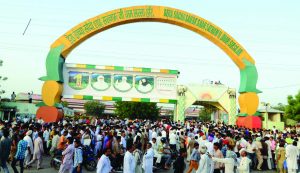 In a new twist, even though an apology has not come from the Akali Dal for the sacrilege incidents or the controversial granting of pardon to the dera chief, there has been a change in stand. The SGPC president and some senior Akali Dal leaders (Badal loyalists) have been saying that the grant of pardon to the dera head was a mistake. The spin doctors in the party know that acceptance of mistake would go down well to re-connect with the voters. Once the connection is made, it will be easy for the party to highlight the anti-incumbency factor against the Congress regime, and better their poll prospects
In a new twist, even though an apology has not come from the Akali Dal for the sacrilege incidents or the controversial granting of pardon to the dera chief, there has been a change in stand. The SGPC president and some senior Akali Dal leaders (Badal loyalists) have been saying that the grant of pardon to the dera head was a mistake. The spin doctors in the party know that acceptance of mistake would go down well to re-connect with the voters. Once the connection is made, it will be easy for the party to highlight the anti-incumbency factor against the Congress regime, and better their poll prospects
before the 2019 General Election.
The SGPC as well as the Akali Dal are also going full throttle to make the 550th birth anniversary celebrations of Guru Nanak, the founder of Sikhism, in November 2019. The party will be using this occasion to its political advantage. How far these attempts succeed, only time will tell. The SAD is is in catch 22 situation because the Congress government, too, is wooing the Sikh community with its own plans for the celebrations. However, will the current upheaval shape up for the SGPC and the SAD, only time will tell.
letters@tehelka.com








